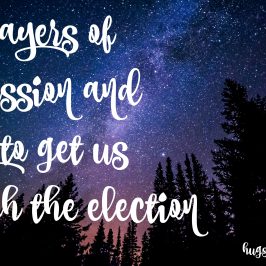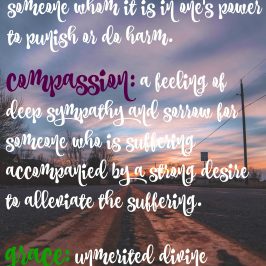Oklahoma has been in a rough patch lately. It seems that every time I turn around our politicians have cooked up some hair-brained shenanigans. Shenanigans I tell you! Unfortunately, hair-brained ideas like trying to keep Oklahoma homophobic and bringing a snowball into congress make national news and make us all look like buffoons. Then some idiot kids make some idiot choices and the next thing you know the world thinks that our University is a breeding ground for racists. Week before last was a tough week.
Thankfully, level heads prevail allowing civil dialog and healing to take place. David Spain (head minister of First Christian Church in Norman, OK) is one of those level heads and always has just the right words to sooth a deep, deep wound. The following is his sermon from the Sunday after the infamous video went viral. This may be a long read in an age of instant sound bites, but healing and reconciliation takes time. Please take time to read, think, process and share.
It has been a difficult week in Norman, to make the most obvious understatement possible. Eight days ago, the President of the United States, an African American, made a speech from the Edmund Pettis bridge in Selma, Ala. and regardless of where one is politically, that image reminds us that in many ways this country is in a far different place than it was 50 years ago. And then, only a few hours later, an incident occurred on a bus of all places, the image of which went viral and has reminded us that in many ways we are not in much of a different place after all.
The reactions to what happened on a bus chartered by a fraternity have been powerful and wide-ranging, described by such words as appalling, disgusting, immature and ignorant. Like the reactions, the responses have been wide-ranging as well and have included anger, grief, fear, cynicism and despair. There has been a deep heaviness to the week.
Perhaps it happens late at night or early in the morning, or perhaps it happens in a quiet lull in the middle of the day, but at some point in the last eight days, most people have pondered the “why” of it all. Why is it that for all we know and for all we can accomplish and for all the good we can do, why is it that lurking within individuals or within groups, along with a sense of personal or group identity, there is also the potential to disparage another?
Why is it that the “other” is so other and differences become so magnified that the other is viewed and/or treated with disdain? Can one be a true Sooner without despising the University of Texas or the Oklahoma State Cowboys? Can one be a patriotic American without hating the Russians? Can one be a loyal Israeli or Palestinian without annihilating the other? Can one side of the political aisle exist without disparaging the other side?
To look at the human condition, to ponder the question “why”, is to recognize that there seems to be no shortage of ways humans despise one another – race, class, gender, gender-orientation, religion – our destructive energy seems boundless.
To be sure, and this does not make it any better, such attitudes about the other have been around for a long, long time. Remember one of the comments made about Jesus – “Can anything good come out of Nazareth?” That is bigotry of the first order. Some, of course, would say that our tendencies toward such destructivity can be explained by original sin – that Adam’s sin is still in our genetic code.
Neither personally nor theologically do I believe that; nor do I believe that humans are born racists. Such attitudes are acquired and reinforced over time. Evidence suggests we are quick studies where racism is concerned, for something in us does struggle with the other. But bigotry and racism are not inevitable. We can be and do better than that.
Having said that, we recognize forces and patterns of life that feed the beast that is bigotry. Ours is a culture that struggles with, and is in danger of losing, the foundation of basic respect. Too many news cycles give room for diatribes and basic civility has become a casualty; what passes for entertainment now is too often hewn on the rocks of ridicule, embarrassment and insult.
Compromise has come to be viewed as weakness; ambiguity and the willingness to consider complexity in life is portrayed as a lack of moral character and resolve; and extremism is often portrayed as the only acceptable expression of true belief. It can certainly be discussed whether or not such attitudes and portrayals of life are the cause or the result of the human condition – that is an important issue not to be resolved here. But let us at least agree that there exists a toxic relationship and that such an ethos is dangerous. It simmers, and then it erupts.
In such an environment as this, the recording of a song like what was sung last Saturday night should not surprise us – offend and mortify us, yes. But it should not surprise. We live in a time in this world and in these United States that sanctions, supports and finances bigotry. Whether it is news or entertainment, we are subjected to a steady diet of people being ridiculed, objectified and dehumanized. There is remarkable culpability.
[Tweet “”Whether it is news or entertainment, we are subjected to a steady diet of people being ridiculed, objectified and dehumanized””]That these were 18 to 21 year olds is no excuse and is part of the reality. These are young people educated enough to have been admitted to a very fine university whose vision, purpose and standards are to advance humanity.
Nevertheless, there are young people whose brains are not fully developed, whose emotions are raw and mercurial and given to behavior that, especially when alcohol gets involved, creates a volatile mix. Let us never, ever make the mistake of empowering this age group to carry any weapon on campus deadlier than their tongues, which as we have seen, is deadly enough. We must call ourselves to a more noble civility.
Throughout the week, I have tried to measure my emotions and reactions and have at times been quite disappointed. I have been aware of a too quick knee-jerk blanket statement. “Well, that’s how fraternities are, we know about that group…well, of course they would respond that way, that’s how they are.” Such comments are embarrassing and not helpful and do not further civility.
I am also aware of being a white male born in the South, and as such, have been in a place of advantage and power not afforded anyone born otherwise. Living from the perspective of advantage can create a myopic viewpoint and can create a tendency to think that my perspective is the true and right one. All humans struggle with this, but it is a particular struggle when the societal patterns and structures have benefited some to the disadvantage of others. I can only imagine what this feels like, to be on the receiving end of a song like this, and I need to remember that.
While these kinds of questions and concerns have been in the forefront this week, the other consideration is of course a religious one. Does our faith have anything to say here? Can the words spoken from our text, from this pulpit, from this communion table, from this church in any way offer a way forward? That question leads inexorably to this confession – far too often religion has been part of the problem and has made matters worse.
One aspect of religious history is its wreckage – when splinter groups within the world’s great religions or when at times the essence of the great religions has exhibited hatred, bigotry and violence. Such cases and periods are well documented, and within the state of Oklahoma as in every other state or nation on God’s world, we are sadly too familiar with the ugly side of religion. Those who would decry religion as destructive have been given far too much evidence to make their case. As one who is representative of the institution of religion and believe in its importance, I cannot ignore that reality and must always respond from a place of humility and not self-righteousness.
As it relates to this particular text from John’s gospel, it is a tragic irony that this passage rooted in love, redemption and transformation has been used at time to convict, condemn and exclude. There are reasons for that, not the least of which is the danger of lifting one verse of scripture and forgetting its context. For many people who grew up in church, John 3:16 is one of the passages that was taught and memorized, and if one did not grow up in church, then it may still be that this verse is known, if only thanks to NFL games in which a poster reading John 3:16 is strategically placed between the goal posts and sure to be televised. It is a wonderful passage of scripture, best read to include John 3:17: “Indeed, God did not send the Son into the world to condemn the world, but in order that the world might be saved through him.”
There is an even larger context than verse 17, and it is Jesus’ late night conversation with Nicodemus, a wonderful person of faith who has come to Jesus and face to face has asked him about life and faith and what is most important. It is toward the end of that conversation that John records Jesus making an obscure but important reference to a time when Moses lifted up a serpent in the wilderness and it was a healing. The Israelites were in the wilderness and invaded by poisonous snakes. Moses is instructed to lift up a bronze image of a snake and by looking to it, the people would be protected and healed.
This is not about idol worship; this is about looking at the very thing that can be one’s downfall, because only by coming face to face with such powerful forces can one be transformed. Think in terms of our issues with race and bigotry – only by coming face to face with such poison do we have the hope of being transformed. With that image in mind, Jesus shifts the metaphor and says that hi too is the one to be lifted up, which of course is a reference to the Cross, and is also a reference to the resurrection. Jesus is the one lifted up and the world is to look on him because he is God’s healing response to hatred and violence and bigotry and evil.
The beauty, the power and the hope of John 3:16 and the story surrounding this wonderful verse, is that God’s response to all that is so destructive in our “human gone wrongness” is not to stay at a distance and condemn; instead, God’s response is to come and live face to face, to risk the vulnerability of a love that calls people to be better, to be transformed,to see one another, and in seeing, to be redeemed. God comes to a world that is too often rebellious and unrepentant and invites people to look on one another from the perspective of God’s love and live by Jesus.
One writer thinks of it this way: “God does not just deal with this world, but deals with it passionately, loving it and suffering for it. ‘God loved the world so much that he gave his only son to it.’ But this is not logic. This is passion. How else would God be willing to part with God’s own son for the sake of us? Nor is this a result of reasoning. It is a risk. And passion always involves risk, does it not? But only in risking will there by new discoveries and exciting experiences,” (Choan-Seng Song, Theology from the Womb of Asia, 199). “Indeed, God did not send the Son into the world to condemn the world, but in order that the world might be saved through him,” which is to say that God is the God of covenant love, and that kind of love never lets us go.





Chris Carter
Whoa… SO powerful. Thank you for sharing this, Stephanie. He speaks TRUTH.
Such a mess this world is…
Sigh.